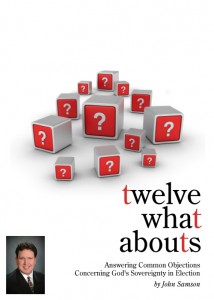 God could have justly left all mankind to perish in their sin and misery, as He left the angels which kept not their first estate, but according to the good pleasure of His will, He chose in Christ, before the foundation of the world, all whom He purposed to save. “According as he hath chosen us in Him before the foundation of the world, that we should be holy and without blame before Him in love; having predestinated us unto the adoption of children by Jesus Christ to Himself, according to the good pleasure of His will” (Ephesians 1: 4,5). “And we know that all things work together for good to them that love God, to them who are the called according to His purpose. For whom He did foreknow, He also did predestinate to be conformed to the image of His Son, that He might be the first-born among many brethren. Moreover whom He did predestinate, them He also called; and whom He called, them He also justified: and whom He justified them He also glorified” (Romans 8: 28-30). These verses from among many which could be quoted, and the whole scheme of redemption from Genesis to Revelation, afford infallible and unqualified proof that salvation is of free and sovereign grace.
God could have justly left all mankind to perish in their sin and misery, as He left the angels which kept not their first estate, but according to the good pleasure of His will, He chose in Christ, before the foundation of the world, all whom He purposed to save. “According as he hath chosen us in Him before the foundation of the world, that we should be holy and without blame before Him in love; having predestinated us unto the adoption of children by Jesus Christ to Himself, according to the good pleasure of His will” (Ephesians 1: 4,5). “And we know that all things work together for good to them that love God, to them who are the called according to His purpose. For whom He did foreknow, He also did predestinate to be conformed to the image of His Son, that He might be the first-born among many brethren. Moreover whom He did predestinate, them He also called; and whom He called, them He also justified: and whom He justified them He also glorified” (Romans 8: 28-30). These verses from among many which could be quoted, and the whole scheme of redemption from Genesis to Revelation, afford infallible and unqualified proof that salvation is of free and sovereign grace.
The ninth chapter of Romans is the Holy Spirit’s commentary on the eternal decrees of God. In connection with these sublime mysteries it becomes us, as sinful finite creatures, to be still and to know that He is God, just in all His ways, holy in His works all, that His judgments are unsearchable and His ways past finding out. As the election of all whom He purposed to save flows from His sovereign good pleasure, so the passing by the rest of mankind has also its source in the unsearchable counsel of His sovereign will, in all the actings of which He is holy, just and true. “Election is the expression of the divine mercy; reprobation of the divine justice. Whoever hold the doctrine of election must hold the doctrine of reprobation. Reprobation implies that God simply passes by the sinner leaving him as he is. In election He makes choice of the sinner in His sovereign grace. Both are acts of the sovereignty of God.” (Rev. D. Beaton, Free Presbyterian Magazine, Vol. 35: p. 244). The non-elect are ordained of God, according to the unsearchable counsel of His will “to dishonour and wrath for their sin, to the praise of His glorious justice” (“Confession of Faith,” Ch. 3, sec. 7). It is not for their being passed by that they are punished, but for their sins. Their being passed by is a sovereign act: their condemnation is a judicial act of God in His capacity as a judge. “Salvation is all of grace, damnation all of sin. Salvation of God from first to last — the Alpha and the Omega; but damnation of men not of God: and if you perish, at your own hands must your blood be required.”
C. H. Spurgeon

 Chapter 7 of my book, “Twelve What Abouts – Answering Common Objections Concerning God’s Sovereignty in Election.”
Chapter 7 of my book, “Twelve What Abouts – Answering Common Objections Concerning God’s Sovereignty in Election.” Jonathan Edwards, from Miscellany, ff:
Jonathan Edwards, from Miscellany, ff: